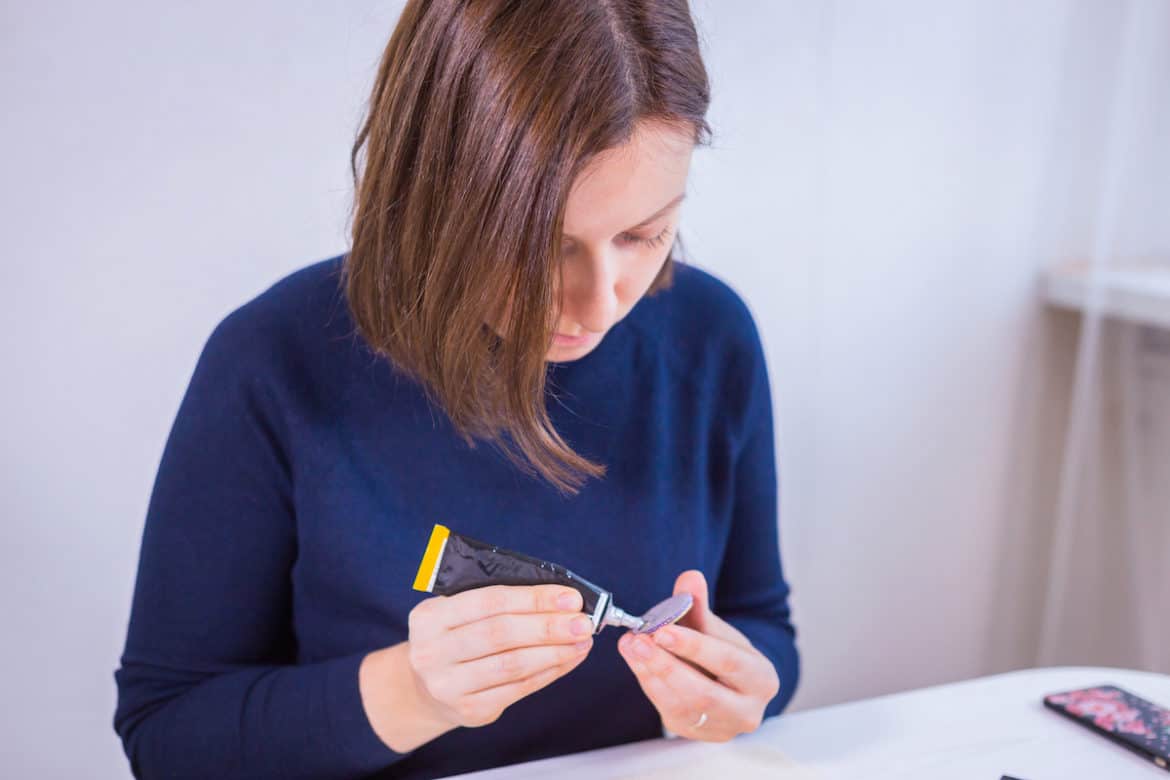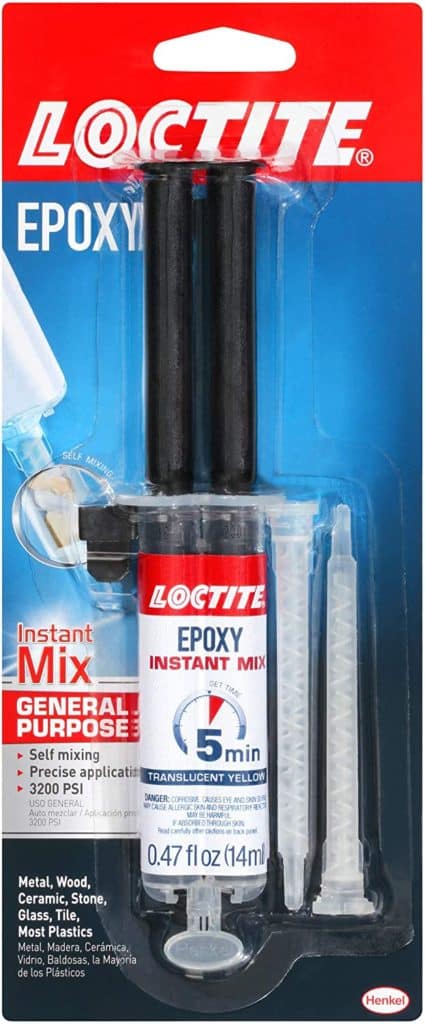Wondering how to join your metal jewelry pieces without the hassle of soldering? Perhaps you’ve been considering glue but aren’t quite sure how well it will hold up.
Well, next to a welding machine, glue is the most convenient, easy to use, and affordable alternative for bonding metal pieces. However, not just any glue can replicate a weld-strong bond.
To avoid the embarrassment of having parts of your metal jewelry fall off when you least expect them to, you need to pick your glue carefully.
So, what is the best glue for metal jewelry? The best glue for metal jewelry is an epoxy glue. It is a heavy-duty adhesive that fuses two surfaces nearly permanent. It offers the most durable metal to metal bonds while also remaining flexible enough for heavy-use items.
There are other options like super glue and polyurethane glue. But you’ll learn why epoxy is the trio’s best if you stick around a little longer.
In this post, we’ll show you the various types of adhesive formulas available for metal jewelry. You’ll also learn how to choose glue for metal jewelry and point you to our top picks. Let’s get gluing.
Good Glues For Metal Jewelry: What To Look For
Adhesive formulas vary in purpose, performance, and strength, among other things. Therefore, when looking to buy glue for your metal jewelry, there are a few factors to consider before making your final decision. Which ones are these?
Type of Glue
First and foremost, check what surfaces the formula is created to adhere to. Not all glue will work with metal surfaces. Epoxy, polyurethane, and super glue are the three types of glue formulated to stick to metal. Each has its strengths and weaknesses.
Epoxy glue is the best glue for metal jewelry. The strength of its bond is unrivaled and is super durable. It will also resist deterioration from harsh physical and environmental elements. That’s all everyone wants in a piece of jewelry, right?
Polyurethane glue bond is fairly strong, but not as strong as epoxy glue. It is okay for fusing other surfaces onto metal but not so great for metal-to-metal bonds.
Super glue is so popular, ubiquitous, and easy to use but forms the weakest bond with metal surfaces. It is thin and runny with a small window time for application. It also bows down to moisture, heat, and pressure, so it’s not your best choice for jewelry.
Setting and Curing Time
Instant glues will dry in a matter of seconds. Other types of glue require a few hours, a full day or even two. If you couldn’t be bothered to wait to wear your pieces, then a fast-drying formula would be ideal.
Setting time is also a critical factor to consider. Glue with delayed setting gives jewelers ample time to position and even reposition the pieces slowly and carefully as desired. This is particularly important for slow-handed jewelers.
Color
You are likely looking for a glue that dries clear. Transparent seals have the advantage of invisibility and do not affect the color of your stones. Clear glue is also forgiving when you make mistakes. You can certainly get away with more as it won’t show and marries seamlessly into the design.
Unfortunately, most epoxy glues will dry with a tint, making the bonded space and any flaws somewhat obvious, so you need to be wary about this. If you are going for a tinted glue, at least let it be paintable.
Resistance to Elements
Many adhesive formulas are affected by changes in temperature and glue for metal jewelry is no exception. Some types of glue melt in high heat and are not suitable for jewelry that will likely be rocked on a hot summer day.
Some people will swim or even shower with their jewelry. Therefore, water-resistance is a critical feature for metal jewelry glue. It’s a bonus if the bond is not affected by chemicals too, as jewelry comes into contact with oils, fragrances, etc.
Flexibility
A layer of glue that dries brittle will not hold up well to danglers. Therefore, flexibility is key when choosing glue for metal jewelry that will experience lots of movement, pressure, or impact of some sort.
Ease of Application
Most importantly, you want to work with as little frustration as possible. A nozzle helps a great deal in making precise applications.
Also, epoxy glues require mixing, which may appear to be an intimidating task. The good news is traditional mixing is so yesterday. There are a few self-mixing brands. Others design their bottles to dispel the hardener and resin equally and simultaneously. You’ll be done within minutes – and accurately.
The consistency of the adhesive also matters. It shouldn’t be too thick or too runny.
3 Best Epoxy Glue For Metal Jewelry
As promised, here is our recommended product section. To save you the trouble of browsing the overwhelming number of glue brands, we’ve reviewed the top 3 products for gluing your metal jewelry.
| Rank | Product | Key Features |
|---|---|---|
| 1. | Gorilla 2-Part Epoxy | 5 min. set, dual application, .85oz |
| 2. | J-B Weld KwikWeld Epoxy | Quick-setting, nozzles, durable, 2oz |
| 3. | Loctite Instant Epoxy Mix | Self-mixing, 5 min. set, nozzle, .47oz |
For more details on each of these beauties, keep reading:
1. Gorilla 2-Part Epoxy
Compared to the ordinary Gorilla glue which is popular, the performance of this two-part – resin and hardener – Gorilla epoxy is on another level. Standing at 3300 PSI, the strength is beyond and above your expectation.
Gorilla epoxy is the best glue for metal jewelry, particularly for metal to metal bonding. It is versatile enough for setting stones and anything else on metal as well.
If you’ve been using epoxy glue before, then you know how hard it is to come by a non-tinted one. You’ll be happy to know that this is one of the few crystal clear brands. It ensures a flawless look as minor mistakes remain invisible to the eye.
The tube body is cleverly designed and packaged to minimize wastage and enhance ease of application. Hardener and resin are kept separate, each with a syringe to prevent mixing and hardening.
The fluids dispel separately yet simultaneously and smoothly. The exterior PVC package doubles up as a mixing plate and comes with a wooden mixing stick.
Mixing the glue is super easy and takes zero skills. You only need to mix in a 1:1 ratio and that is just it. Both come out uniformly. The epoxy glue fully sets after 5 minutes from the time application. That’s ample time to align the pieces or stones accurately even for a beginner.
2. J-B Weld KwikWeld Epoxy
For the most robust metal to metal bond, the J-B Weld steel reinforced epoxy is your best bet. The two-part adhesive forms a long-lasting bond for your metal jewelry pieces.
With a tensile strength of 3127 PSI, there’s no doubt that this is great stuff.
J-B epoxy formula is water, chemical, and weather-resistant too. It is ideal for metal jewelry that can be rocked outdoors all day long. Regardless of the lifestyle or surrounding conditions, everything stays glued where it is supposed to.
It is relatively easy to mix and use but takes a significant amount of time to fully dry – a maximum of 6 hours. Also, it dries grey as opposed to the coveted transparent but it can be sanded and painted over, so it won’t destroy your project.
You can easily overlook these if you are serious about superior performance and strength. It is the best glue for durable metal to metal bonding in jewelry.
3. Loctite Instant Epoxy Mix
Loctite epoxy is the easiest version of epoxy glue you will ever use. It comes with a self mixing syringe that dispenses a surface-ready glue.
Performance-wise, this Loctite product delivers a tough epoxy bond rated at 3200 PSI for strength. It provides two metal surfaces with outstanding adhesion. It can also be used to permanently fix stones and other material to metal charms and findings.
As expected of epoxy glue, it forms a bond resistant to various elements including, water, chemicals, temperature, pressure, and shock. The bottle comes in a pointed fine tip nozzle for precision; a vital feature for gluing parts of jewelry that tend to be small.
It is a decent choice that performs as expected at a great price and worthy of checking out for small metallic and stone attachments.
Related Glue Questions
Here are some other common glue questions about jewelry-making, just in case you’re wondering what else may (or may not) work in your next project!
Is Gorilla Glue Good For Jewelry?
Gorilla glue is good for a lot of crafts but certainly not jewelry. Most jewelry is metallic and requires strong adhesive for metal like epoxy glue to stand up to everyday outdoor use and harsh elements.
Only the Gorilla epoxy glue (that we’ve included above in this review) can hold up well with jewelry. The original gorilla glue and other non-epoxy Gorilla glues will form a less permanent bond on metal jewelry that will wear off within a short time and won’t be flexible or hardy enough for well-worn items.
Does Super Glue Work On Jewelry?
Super Glue technically does work on jewelry, but offers short-term results. It is convenient, readily available, and easy to use. It creates a reasonably strong bond on many surfaces, even metal.
It could work for a while, but unfortunately, it is too thin for an item that will be worn over and over. The strength of the bond is not sufficient for durable jewelry and will bow down to pressure, impact, water, heat, and solvents.
Up Next: How To Cut Intricate Designs On Sheet Metal



